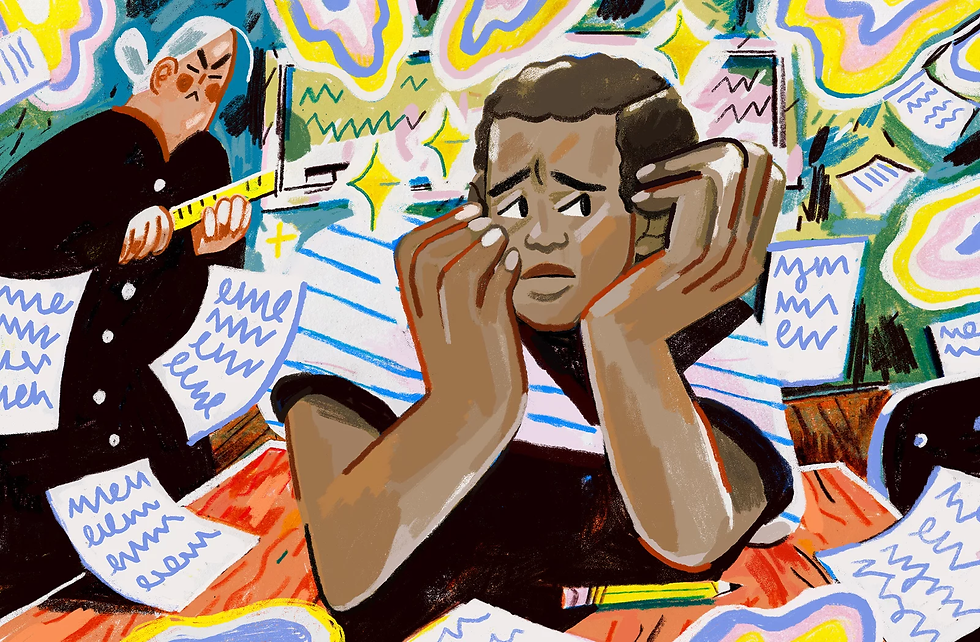Who plays a bigger role in education?
- missylienglish
- Mar 21, 2022
- 3 min read
Who plays a bigger role in education? The authorities? The teachers? The parents? Or learners themselves?
Chinese parents' putting too much trust in teachers and schoools?
As a teacher, one of the parties that I have to constantly deal with (thought it sounds a bit negative when I use the words 'to deal with' but indeed sometimes I do have to 'deal with' them) is the parents. Like many of the teachers, especially secondary teachers, most of the time when teachers call their parents, the mission will be to inform them of the misconduct of the child or to report the complaints received from other teachers. Very rarely will the teachers call the parents just to praise how well-behaved or how hard-working their child is in school. I mean, of course teachers should do that more often and to keep the parents updated about their child's learning progress but teachers are just too busy with everything that's happening in the school.
Before Covid-19 struck us, Chinese parents generally are quite passive in their child's learning. I think part of the reason for this has to do with the trust that parents have in schools and teachers. In one of the articles I read earlier about Chinese parents' beliefs and attitudes on early childhood education are strongly influenced by Confucian culture, which has laid great emphasis on adoring authority and respecting teachers (Hargreaves, 2000). However, as most of the lessons, if not all, now take place online because of the pandemic, parents are forced to keep an eye on their child's learning. Studies have shown that parents are under tremendous stress and are unsatisfied with the lack of support provided by either the government or the school.
Parents should be equipped with the necessary IT skills and knowledge
What's worse is that many of the Chinese parents generally hold negative views on online learning as they think their children lack self-discipline, are easily distracted, and the fact that excessive screen time harm their children's physical and mental health. Indeed, technology does do certain level of harm to our children's learning but what I think is more important is to educate the parents and to equip them with the necessary skills and knowledge to assist their kids when distance learning is still practised because of Covid-19 (or even without Covid-19). Instead of just blindly trusting the school and the teachers that quality education will be provided to their children, parents should actually take up a more active role in their children's education.
Of course I am not blaming the parents for their lack of involvement in their children's education, but what I am suggesting is that parents should learn from the lesson Covid-19 has brought us --- that learning does not necessarily happen in the classroom. Children learn from the people who are around them and learn everywhere. If the parents seem to put minimum efforts into helping their own child when circumstances do not allow their child to learn in schools and only blame the children themselves for their poor academic performances.
Like treating various illnesses, early intervention is key. Parents should shoulder part of the responsibility for their children's success in learning and hold on to that power for as long as their children need. After all, parents know their children the best, don't they?

Extended Reading:
SCMP Letter: Hong Kong parents are not the real problem, the grades-driven education system is
Dong, C., Cao, S., & Li, H. (2020). Young children’s online learning during COVID-19 pandemic: Chinese parents’ beliefs and attitudes. Children and Youth Services Review, 118, 105440.
Lau, E., & Lee, K. (2021). Parents' Views on Young Children's Distance Learning and Screen Time During COVID-19 Class Suspension in Hong Kong. Early Education and Development, 32(6), 863-880.
Hargreaves, A. (2000). Mixed emotions: Teachers’ perceptions of their interactions with students. Teaching and Teacher Education, 16(8), 811-826.




Comments